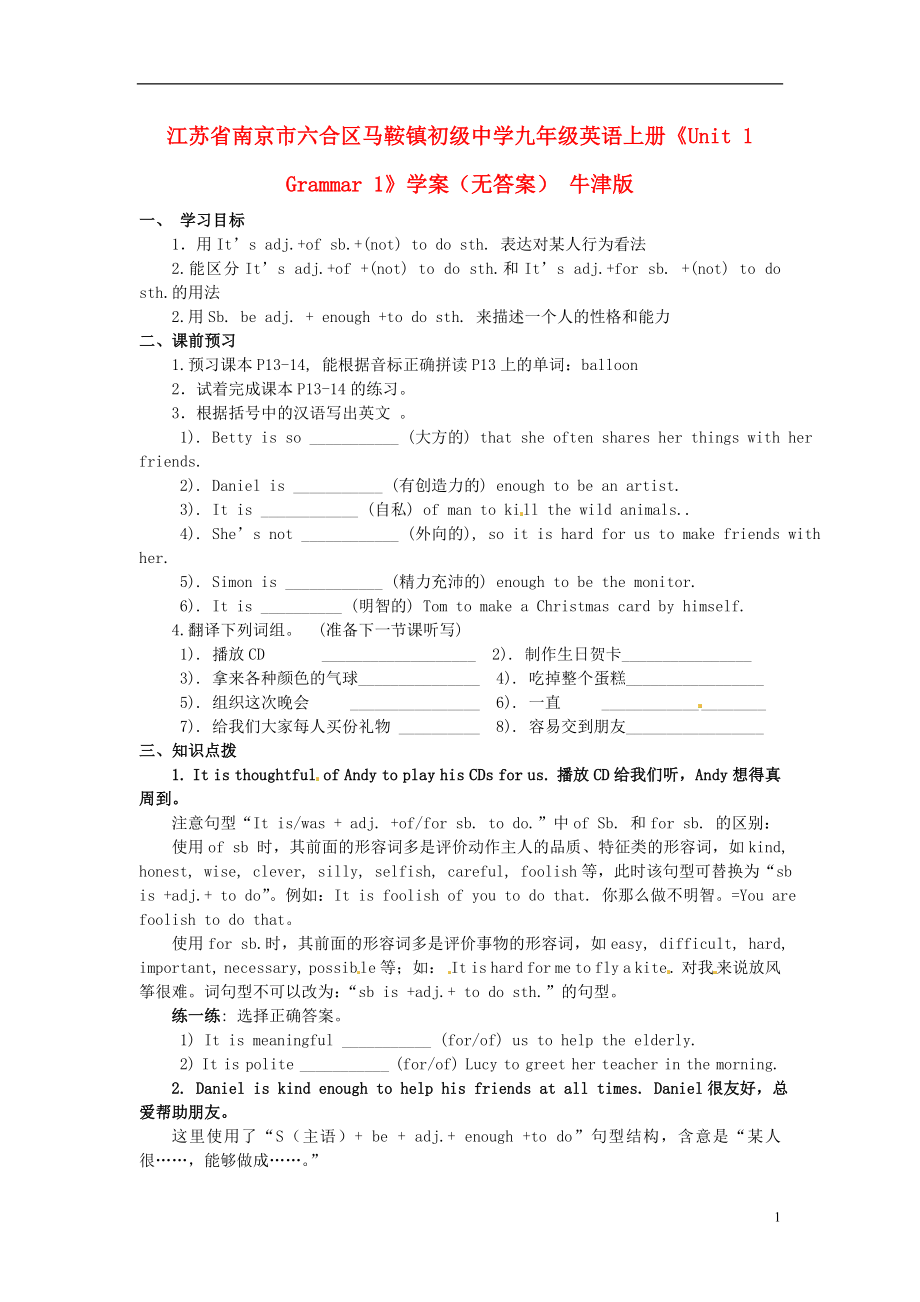《江蘇省南京市六合區(qū)馬鞍鎮(zhèn)初級(jí)中學(xué)九年級(jí)英語(yǔ)上冊(cè)《Unit 1 Grammar 1》學(xué)案(無(wú)答案) 牛津版》由會(huì)員分享�����,可在線閱讀���,更多相關(guān)《江蘇省南京市六合區(qū)馬鞍鎮(zhèn)初級(jí)中學(xué)九年級(jí)英語(yǔ)上冊(cè)《Unit 1 Grammar 1》學(xué)案(無(wú)答案) 牛津版(2頁(yè)珍藏版)》請(qǐng)?jiān)谘b配圖網(wǎng)上搜索����。
1����、
江蘇省南京市六合區(qū)馬鞍鎮(zhèn)初級(jí)中學(xué)九年級(jí)英語(yǔ)上冊(cè)《Unit 1 Grammar 1》學(xué)案(無(wú)答案) 牛津版
一����、 學(xué)習(xí)目標(biāo)
1.用It’s adj.+of sb.+(not) to do sth. 表達(dá)對(duì)某人行為看法
2.能區(qū)分It’s adj.+of +(not) to do sth.和It’s adj.+for sb. +(not) to do sth.的用法
2.用Sb. be adj. + enough +to do sth. 來(lái)描述一個(gè)人的性格和能力
二����、課前預(yù)習(xí)
1.預(yù)習(xí)課本P13-14, 能根據(jù)音標(biāo)正確拼讀P13上的單詞:balloon
2.試著完成課本P13-1
2����、4的練習(xí)。
3.根據(jù)括號(hào)中的漢語(yǔ)寫(xiě)出英文 ����。
1). Betty is so ___________ (大方的) that she often shares her things with her friends.
2). Daniel is ___________ (有創(chuàng)造力的) enough to be an artist.
3). It is ____________ (自私) of man to kill the wild animals..
4). She’s not ____________ (外向的), so it is hard for us to make frie
3、nds with her.
5). Simon is ____________ (精力充沛的) enough to be the monitor.
6). It is __________ (明智的) Tom to make a Christmas card by himself.
4.翻譯下列詞組����。 (準(zhǔn)備下一節(jié)課聽(tīng)寫(xiě))
1). 播放CD ___________________ 2). 制作生日賀卡________________
3). 拿來(lái)各種顏色的氣球_______________ 4). 吃掉整個(gè)蛋糕_________________
5). 組織這次
4、晚會(huì) ________________ 6). 一直 ____________________
7). 給我們大家每人買份禮物 __________ 8). 容易交到朋友_________________
三���、知識(shí)點(diǎn)撥
1. It is thoughtful of Andy to play his CDs for us. 播放CD給我們聽(tīng)���,Andy想得真周到。
注意句型“It is/was + adj. +of/for sb. to do.”中of Sb. 和for sb. 的區(qū)別:
使用of sb 時(shí)���,其前面的形容詞多是評(píng)價(jià)動(dòng)作主人的品質(zhì)�、特征類的形容詞,如k
5����、ind, honest, wise, clever, silly, selfish, careful, foolish等,此時(shí)該句型可替換為“sb is +adj.+ to do”����。例如:It is foolish of you to do that. 你那么做不明智。=You are foolish to do that��。
使用for sb.時(shí)��,其前面的形容詞多是評(píng)價(jià)事物的形容詞����,如easy, difficult, hard, important, necessary, possible 等;如: It is hard for me to fly a kite. 對(duì)我來(lái)說(shuō)放風(fēng)箏很難�����。詞句型
6��、不可以改為:“sb is +adj.+ to do sth.”的句型��。
練一練: 選擇正確答案�����。
1) It is meaningful ___________ (for/of) us to help the elderly.
2) It is polite ___________ (for/of) Lucy to greet her teacher in the morning.
2. Daniel is kind enough to help his friends at all times. Daniel很友好���,總愛(ài)幫助朋友��。
這里使用了“S(主語(yǔ))+ be + adj.+
7���、enough +to do”句型結(jié)構(gòu),含意是“某人很……���,能夠做成……���。”
例如:He is rich enough to buy a car. 他很富有����,買得起一輛小汽車。
練一練: 翻譯下面句子����。
1). 他很強(qiáng)壯,搬得動(dòng)這個(gè)重箱子。
2). Millie十分聰明�,能回答出這個(gè)問(wèn)題。
“形容詞+enough to do”結(jié)構(gòu)還可以和“too…to”����、“so…that s + can’t/can do”結(jié)構(gòu)進(jìn)行轉(zhuǎn)換。
eg. The question is easy enough for him to answer. = The question is so easy tha
8�����、t he can answer it.
He is not strong enough to carry the box. = He is so weak that he can’t carry the box. = He is too weak to carry the box.
練一練: 用enough改寫(xiě)下面句子���。
1) Daniel is so creative that he can become a writer.
Daniel is _______ ________ ______ become a writer.
2) My sister is too you
9�、ng to go to school.
My sister is _____ ______ _______ _______ go to school.
四����、課堂鞏固
A) 用of和for填空。
1. It is bad _______ you to eat too many sweets.
2. It was selfish ________ Eddie to eat all the cake.
3. It is generous ________ Jim to give all his cartoons to his cousin.
4. It is i
10����、nteresting ________ children to watch comedies and cartons.
5. It was careless _____ ___ Simon to knock over the glass of water.
6. It was kind ________ you to give your seat to the old man on the bus.
7. It was wise ________ Kitty to bring balloons of all colours to the party.
8. It is
11、important ________ students to read English for half an hour every day.
B) 句型轉(zhuǎn)換����。
1. My sister is very kind. She likes to take care of others.(將兩句話合并)
It __________________________ to take care of others.
2. The boy is so tall that he can reach the apples on the tree.(改為同義句)
The boy is
12��、____________________ reach the apples on the tree.
3. Reading English every day is necessary for us. (改為同義句)
It’s ____________________ English every day.
4. His brother is too young to go school. (改為同義句)
His brother is ________ to go to school. = His brother is ________ he _____ go to school.
2
 江蘇省南京市六合區(qū)馬鞍鎮(zhèn)初級(jí)中學(xué)九年級(jí)英語(yǔ)上冊(cè)《Unit 1 Grammar 1》學(xué)案(無(wú)答案) 牛津版
江蘇省南京市六合區(qū)馬鞍鎮(zhèn)初級(jí)中學(xué)九年級(jí)英語(yǔ)上冊(cè)《Unit 1 Grammar 1》學(xué)案(無(wú)答案) 牛津版

